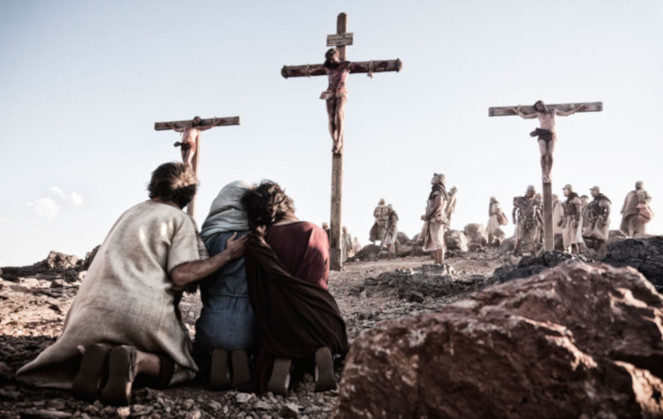
On Good Friday, we celebrate the saddest day in history.
Blood streamed down his face. Massive thorns stuck to the head of their Maker. Groans of agony came from the mouth of him who spoke the world into being. The soldiers beat him. They flogged him. They tortured him.
As he inched through the streets of Jerusalem, his cross pressing into his lacerated back, many shuddered at him. The face of God, which Moses could not look at and live, could no longer even be recognized as human (Isaiah 52:14). Women hid their children from the bloody mass of flesh before them. Men taunted him. Soldiers clubbed him. Angels shrieked in horror.
Every prophecy about his suffering was being fulfilled. By judgment and oppression, he was taken away. His sheep scattered when their enemies struck him. One of his own sold him and betrayed him with a kiss. He found no rest as they beat him, spit on him, and mocked him through the night. In the morning, he gave his back to those who struck him, his cheeks to those who plucked his beard.
He stepped forward to Calvary as a lamb to the slaughter.
His Love Was Rated-R
I remember the first time I watched The Passion of the Christ fourteen years ago. The sight of Roman ninetails sinking their claws into his back seemed to pierce my soul with Mary’s (Luke 2:35). The blood. The screams. The anguish. I could never again thoughtlessly tell others that Christ died for them. The scene forbade cliché. It was grizzly, ghastly, gruesome — rated-R.
I rarely cry, but as I watched Jesus shed his blood all over the Roman courtyard, I could not help but weep. As they held the nails over his hands and feet — his mother watching him — every swing of the hammer pierced my heart. Only the heartless could watch unfeelingly. Has there ever been a more tragic scene?
I did not consider his wounds enough. I did not weep over his suffering as often as I felt I should have. But how does Jesus respond to me, and people like me, who take Good Friday to grieve over his unbearable sufferings? Two thousand years ago he said to those weeping for him that day, “Weep not for me; weep for yourselves.”
Silence on the Set
Of the many horrors of Calvary, one that was especially acute was the shame of it all (Hebrews 12:2). His was a public execution. The condemned usually were naked. To add to this, the prophecy reads, “All who see me mock me; they make mouths at me; they wag their heads” (Psalm 22:7). It is one thing to suffer; another to do so before a whole nation as they ridicule you.
But mockery was not the only sound made on his behalf. A host of women trailed behind him, lamenting the expiring prophet. They followed Jesus’s drops of blood — as so many of us do today — with drops of tears.
But upon hearing their sobs, Jesus, battered and broken, turned his face towards them and spoke these gracious, yet shocking words: “Daughters of Jerusalem, do not weep for me, but weep for yourselves and for your children” (Luke 23:28).
This part of the passion didn’t make the movie.
On that first Good Friday, Jesus turned to his loudest sympathizers — those who are not cursing him, mocking him, but wailing on his behalf — and silenced them. He commands their tears escort him no further. He opts to press into the night without their mourning.
Weep Not for Me
Jesus did not need their tears two millennia ago, and as unpopular as it may be, Jesus does not need our tears today. And this fact owes to us seeing his passion through the eyes of faith.
Weep not for me, he said. As if to say,
I am saving my people. I have prayed, tender souls, and know my Father’s will concerning this cup — shall I not drink it (John 18:11)? My hands willingly grasp this wood because my food is to do my Father’s will (John 4:32, 34). And his will is glorious: he sent me to serve and give my life as a ransom for my people. My body is broken, and my blood is spilled for you (Luke 22:19–20). Greater love has no one than this, that he lay down his life for his friends. Do not weep over the labor pains that give birth to your salvation and unshakable joy (John 16:20–22).
Weep not for me, as if to say,
I am not a helpless victim. I am a warrior-king with thousands of angels at my beck and call (Matthew 26:53). One word from me and this horror would end. One word from me and Rome would be destroyed. One word from me and all would be eternally condemned. But I was sent to save the world, not condemn it (John 3:17). Trust that no man — or army — can steal my life from me. I lay it down of my own accord, and I will take it up again (John 10:11–18).
Weep not for me, as if to say,
I am conquering. You see my heel being bruised and you mourn — but look through the eyes of faith and see the serpent’s skull trampled (Genesis 3:15). Although I walk as the Lamb, I conquer as the Lion — the predator, not the prey, will hang on the cross (Revelation 5:5–6). I am a King who shall rule the universe from a tree. And I shall make this cross my scepter. As they lift me up, I thrust my enemies under my feet as a footstool (Psalm 110:1). My triumphal entry is followed by a triumphal exit. Why should you weep over my hour of glorification (John 12:27–28)?
Weep not for me, as if to say,
Sunday is coming. I have said repeatedly that in three days I shall rise (Matthew 16:21; 17:22–23; 20:18–19). Although today is full of unutterable darkness, unimaginable pain, unthinkable terror, Sunday is coming. My Father’s perfect hand is crushing me, evil men are murdering me, my disciples have fled from me, but truly I tell you, Sunday is coming. Joy is set before me and empowers me to endure. A crown awaits me. An endless celebration awaits me. My blood-bought people await me. Eternal glory awaits me. My Father awaits me. Weep not for me.
Weep for Yourselves
Jesus does not stop their tears completely but redirects them: “Do not weep for me, but weep for yourselves and for your children.” God’s wrath will soon visit the people for their sin. The nation that rejected her Messiah — not Jesus — is to be pitied.
“Behold, the days are coming when they will say, ‘Blessed are the barren and the wombs that never bore and the breasts that never nursed!’ Then they will begin to say to the mountains, ‘Fall on us,’ and to the hills, ‘Cover us.’” (Luke 23:29–30)
“Weep for yourselves,” as if to say,
I can bear my cup, but you cannot bear yours. Rome will kill your children before your own eyes. The beast you conspire with today will surround you tomorrow. Your anguish will be so severe that it is better to collect these tears in a bottle to save for that dreadful day.
My sufferings will end at death; yours may not. Many of you will cry for the mountains to cover you, but that can only spare you from the judgment of Rome — it cannot spare you from the judgment of God. The hounds of his justice do not stop at death. He is God of both the living and the dead (Acts 10:42). Vengeance is his; he will repay (Hebrews 10:30). And it is a fearful thing to fall unshielded into the hands of the living God (Hebrews 10:31).
Weep for your sins. Gentle daughters, useless are the tears that fall on my behalf because of suffering but never fall because of sin. Many weep over my suffering, but not the sin which caused it. The horror you see before you is my becoming sin for my people and bearing the wrath they deserve, that they should have my righteousness (2 Corinthians 5:21). If you weep, better to weep over the lust that hammers the nail deeper, the lie that sticks a thorn in the brow, the cowardly duck that makes a gash upon me, the prideful strut that keeps me upon Calvary’s path.
It Was My Sin
I watched The Passion of the Christ each year for four years — being moved every time to tears — all while I was not truly born again. And I thought myself better for crying, as if my sins would be passed over if I had tears painted on my doorpost. It did not take a regenerate heart to weep over the sufferings of Jesus — our world is full of unbelievers who cry over sad things — but it did take a regenerate heart to mourn over what I rarely really mourned over: my sins (James 4:8–10).
And those who witnessed Jesus’s execution two thousand years ago didn’t see their sins in the cross either: “Who considered that he was cut off out of the land of the living, stricken for the transgression of my people?” (Isaiah 53:8). The horror stayed “over there,” while they remained innocent bystanders. They missed the point and beauty of the cross. They cried and cried, but had not love. Until we can truly sing, “It was my sin that held him there, until it was accomplished,” we weep for him in vain.
We should weep indeed at the foot of the cross, but not with pity. With faith. Those tears don’t dry up the Monday after Easter. Those tears mourn over the sin that nailed him there. Those tears sing over him as our conquering King. And those tears celebrate his death until he returns.
Greg Morse is a staff writer for desiringGod.org and graduate of Bethlehem College & Seminary. Article first appeared Here

